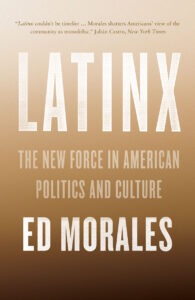Part social history, part political theory, part philosophical reflection, and part memoir, Latinx: The New Force in American Politics and Culture is a book about Latino racial identity. Starting with the origins of race discrimination in the Spanish Conquest and the formation of the mestizaje hierarchy in Latin America, Latinx describes how migration to the U.S. has affected its racial binary. The implications of Latinx racial identity are then fleshed out in new ideas about language, politics, and media, and the possibility of change.
Latinx tells the story of how the racial identity of Latin American descendants in the U.S. offers a counter-narrative to American history. While mestizaje, or âthe mixture,â was implemented to preserve white privilege, its superficial endorsement of a mixed-race heritage had mixed results in the U.S. While many simply aspired to whiteness, the encounter with the harsher black-white racial binary in the U.S. forced many Latinos to reject the âhonorary whiteâ status they sometimes were granted in Latin America to identify as black and indigenous, forming the core of progressive political empowerment for Latinos in the 1960s and 70s.
Latinx documents the transition between those progressive movements to neoliberal representations of Latinidad that tend to emphasize whiteness despite the reality that the majority of Latinx in the US are nonwhite and have marginalized social class status. The book takes a hard look on the impact of how media and political representation of Latinos often participates in the erasure of black and indigenous elements. This has created a crisis in the idea of Latinidad itself.
The use of the term Latinx by non-binary identifying people reflects the way Latino identity critiques binary categories, adding another layer to the discussion. Latinx the book argues that while elusive, Latino identity is defined by âdifference,â whether itâs identification by race or gender, and that for Latinx to coherently define their identity it must be in opposition to normative definitions of âAmerican.â This kind of identification is growing increasingly important in times of the resurgence of authoritarian politics, which go out of their way to persecute difference.


